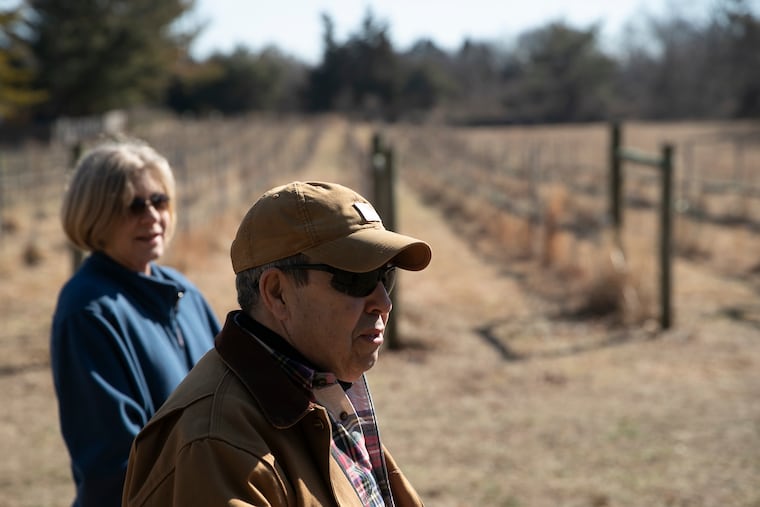The plan for an ‘Ocean City Winery’ hit a major snag in front of the county farm board
Winery owners hoped for site plan approval. What they got could send the project back to square one.

CAPE MAY COURT HOUSE — A couple dozen neighbors came prepared to face off against Mike and Robin Halpern, owners of a small vineyard in Upper Township with a dream of opening something called the “Ocean City Winery.”
The five members of the Cape May County Agricultural Development Board came prepared to rule on a detailed site plan, having already decided that the five-acre property a few miles outside Ocean City itself is a commercial farm properly falling under their jurisdiction.
Everyone, naturally, brought lawyers. But this hour last Thursday was anything but happy, as the 80-seat winery plan appeared to hit a significant snag brought on by several cascading legal maneuvers that left all sides, well, perhaps needing a drink.
“This just seems like a colossal waste of everybody’s time,” said Alfred Natali, one of five unpaid members of the Cape May County Agricultural Development Board, and himself the founder of Natali Vineyards in Cape May County. “And that’s before we ever get to the merits.”
Tensions have been rising along the vineyards behind Bayaire Road that once were home to a tree farm, but now are the property of the Halperns, who moved to the area from Collingswood with a dream of opening a winery. The neighbors seem prepared for a long fight, while Halpern has a system where he is alerted if neighbors cross over from their backyards onto his property. One was recently warned about trespassing.
Ocean City itself is a dry town, and both sides agree that the branding of the proposed winery about two miles outside Ocean City is clever and likely to draw a lot of Shore-goers.
» READ MORE: This couple retired to the Shore to open the 'Ocean City Winery.' What could go wrong?
But neighbors have protested the plan, saying the site is, in fact, too small and too wedged into a residential neighborhood. They have objected to Halpern’s use of spray pesticides, and to an 80-person capacity they say will lead to some very un-farm-like noise and drinking.
The Halperns say their plan is well within the laws of New Jersey’s Right to Farm act, which views wineries as an acceptable commercial enterprise for farmers. They say the five-acre measurement, the minimum required, is accurate, though neighbors have questioned that.
The Halperns say they have tried repeatedly to accommodate neighbors’ concerns, agreeing not to hold weddings, limiting the hours and capacity, and moving the entrance to the proposed winery off the local residential street and onto Route 9.
But, it turns out, that accommodation meant involving an easement from a residential lot the Halperns own, which technically does not fall under the jurisdiction of the Agricultural Board.
This led to several questions Thursday. Were neighbors of the residential lot properly notified, in addition to neighbors of the winery site itself? Can the Agricultural Board rule on a plan that involves a non-farm property?
Does the issue call into question the ruling back in October that the Halperns’ property is a commercial farm? (The Halperns say no. The solicitor for the board seemed to think it might, and the lawyers for Upper Township and the neighbors were happy to entertain the possibility.)
Colin Bell, attorney for the Halperns, said the couple would simplify the matter by moving the entrance across the property line to be contained within the limits of the initial lot identified as a commercial farm.
But that switch triggered another round of objections, as Richard King, representing the neighbors, and Frank Corrado, appearing for Upper Township, both insisted that the change in the plan was significant and needed to be resubmitted. The legal question of whether this now would require the board to start over again in considering the property’s farm designation went unresolved.
“It’s a big deal to make that change,” said Corrado.
John Batastini, solicitor for the board, further unsettled matters by repeatedly referring to an expected appeals process that he thought could take years.
Bell said they will resubmit the most current plans. But the board still has to decide whether any of this means they need to look again at whether the property qualifies as a commercial farm. There’s no date for a future meeting.
After the hearing, Mike Halpern said he was undeterred by the process, even though the delays essentially give the neighbors what they want: no winery, at least for now. “It’s another attempt to hold us up,” he said. “It motivates me to keep fighting.”